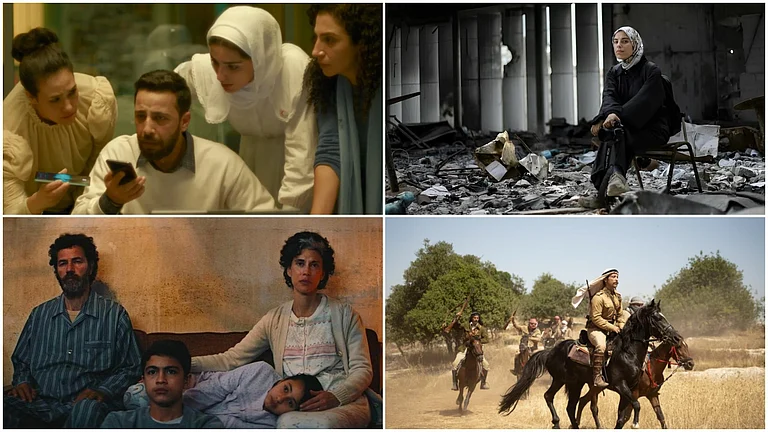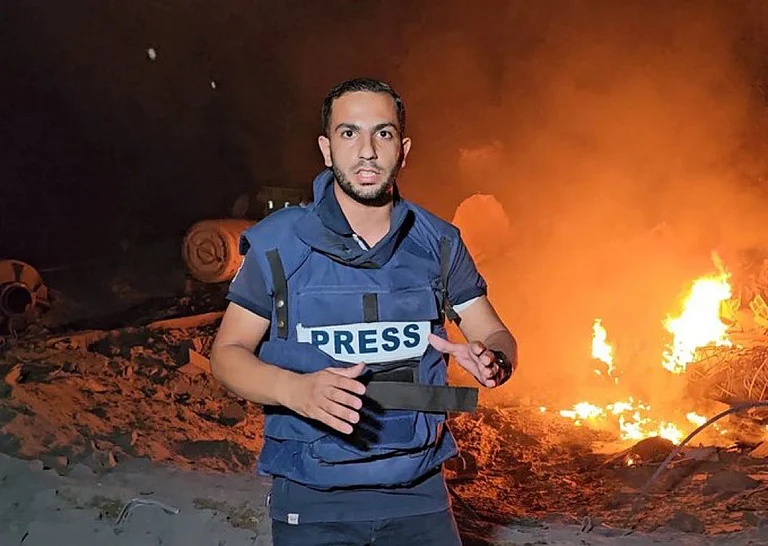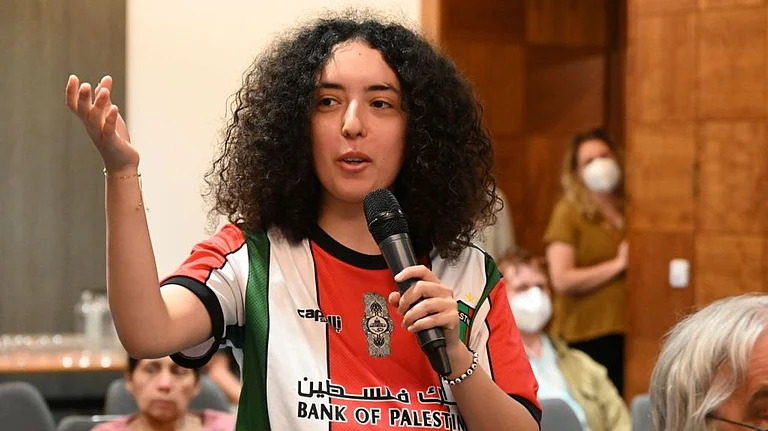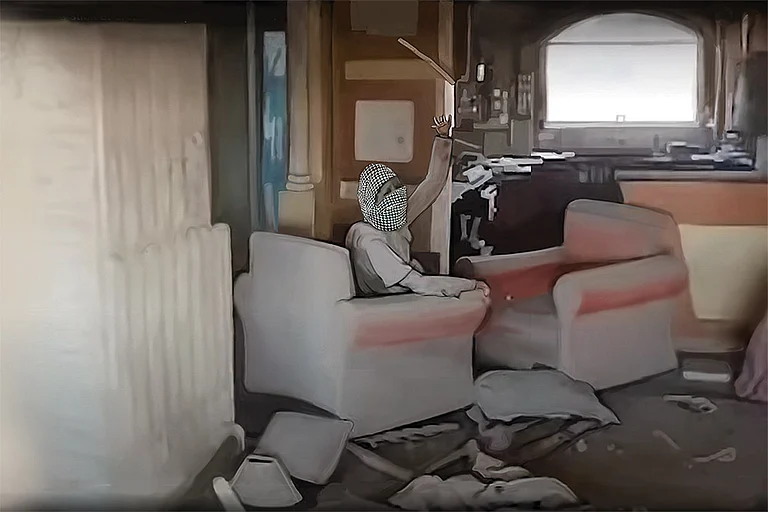Having never stepped outside his homeland, Abdullah Mohammed Abu Shawesh boarded an airplane for the very first time at the age of 39. Born and raised in the Nuseirat refugee camp in Palestine, even the process of acquiring a passport felt extraordinary. After all these years, he still carries the key to his grandfather’s house.
'From The Ashes Like The Phoenix, Palestinians Will Rise': Ambassador Abdullah Shawesh
In a wide-ranging conversation with Outlook, Ambassador Abdullah Ali Shawesh spoke of exile and memory, media erasure and misrepresentation, the contested narratives of October 7, India’s shared history of resistance, global protests for Palestine, and above all, the unbroken hope that Palestinians will return stronger in Gaza and the West Bank.
Today, Shawesh serves as the Ambassador of Palestine to India. Yet the position has carried a heavy personal cost. Living far from his family, he was unable to return to Gaza to see his father during his final days—forced instead to say goodbye over a phone call.
On September 10, Ambassador Shawesh visited Outlook with Dr. Imen Mohabeddine (Supervisor, Arafat-Indira Cultural Centre) and Ms. Omi Krishna (Ambassador’s Office in charge). In a conversation with Outlook, Ambassador Shawesh reflected on the October 7, 2023, attack, the ongoing genocide and famine in Palestine, Israel’s claims of a “right to defend,” Hamas’s relationship with civilians in Gaza, and the wave of global protests backing the Palestinian cause.
Edited excerpts:
What do you think about the media coverage of the war in Gaza?
The link between media and Palestinian history goes back to the Balfour Declaration. When it was issued, the media played a despicable role against us [Palestinians]. It began promoting the slogan: ‘A land without a people for a people without a land.’
Could you imagine? When they implied “without people”, we, the indigenous people, completely disappeared from the Western media at that time. The media played a crucial and unfair role in making that claim.
When, in reality, we, the Palestinians, were a well-developed place, a well-developed nation and a well-developed people at that time.
This continues till today. Even now, our narrative as Palestinians, as indigenous people, is not there [in the media].
Do you feel like the media has reported fairly on the ongoing actions on Palestinians?
There is reporting about the Palestinians which is a bit fair. But this is not a matter of reporting and counting the Palestinians killed. Yes, 237 journalists have been killed in Palestine, including Shireen Abu Akleh. However, revealing the facts about the Palestinian issue is completely different from reporting from Palestine, from Gaza.
This is very important. Even though the number of Palestinians killed is being reported, the media did not give us the opportunity to tell our story—not [just] the numbers.
The numbers are there; you can find them from the United Nations. Or anyone can find the numbers on Google. But the names? The media is not going to report about the names, the stories of the people who have been annihilated in 705 days of continuous war and the genocide conducted by the United States of America and Israel.
Can you tell us more about the Palestinian view of October 7, 2023?
October 7 is a fact; no one can deny it. It [Hamas attack on Israel in 2023] happened. But what exactly happened on October 7, no one yet knows. What exactly happened...or how it happened.
We have two schools of thought when it comes to this unfortunate event—our argument is that it was an unfortunate event—but also, we cannot analyse it, see it, or watch it through the Israeli or Zionist lenses. You should see the issue through its historical perspective.
We cannot talk about the Indian Revolution in 1857 without tackling the more than 200 years [of East India Company rule and wars] before that. Otherwise, we will go on to accept the British narrative regarding that event.
We will not accept, as Palestinians—as Indians we should not accept—classifying the Palestinian people as terrorists. Otherwise, you [as Indians] had already been classified [as terrorists]. Your ancestors had been classified as terrorists and hanged to death. So, India and Palestine have shared history.
The rationalist school of thought says that you cannot discuss any issue based on an analysis of [just its] symptoms, without tackling the root causes.
Just looking at October 7th as an isolated day—as if it is the first day of the creation of the galaxy itself—is completely against the rationalist school of thought.
What would the rationalist school of thought be here?
The rationalist school of thought was represented by the United Nations Secretary-General, His Excellency António Guterres, in his speech on October 24, 2023, before the Security Council, when he condemned all of this. Guterres said it was not happening in a vacuum.
So they declared him persona non grata and [said] that he should not visit [Israel]. He dared that one time, but he did not repeat it.
But this is the rational school, which says that you cannot tackle an issue by isolating it from its historical background.
Is there anyone in Indian history that you particularly admire?
Palestinians will not accept the murder of [Indian independence movement revolutionary] Bhagat Singh. We cannot, as Palestinians at least, accept that the United Kingdom murdered him...that he was hanged to death. For us, he is a martyr, just like Mahatma Gandhi, and all of those apprehended [by the British]. We cannot accept the United Kingdom's narrative [on India's freedom movement].
What other issues does Palestine face with such narratives?
Another school of thought, which aligned itself with the Israeli argument that Western countries use, is that 'nothing justified October 7'. So, 106 years of continuous Palestinian suffering is dismissed.
We, all of Palestine, still have the title deeds to our land. Israel, till today, manages and deals with our property with the very special law, called the Absentee Property Law. Once they expelled us from the historical land of Palestine, they discovered thousands of homes [there]. Besides the lands and properties that they ‘inherited’, they inherited the banking system and the main airport. The Ben Gurion Airport is originally a Palestinian airport called Lydda Airport.
So, if you say all of this did not justify October 7, we can still live with that—but you should be fair enough to say that October 7 did not justify the killing and targeting of 65,000 innocent Palestinians!
They killed many Hamas fighters, but they are not registered [as deaths in Israeli attacks]. Some key figures, such as Yahya al-Sinwal and others are there [on the record as killed]. But that is 10, 20, 30 of them—what about the 65,000 killed since October 7?
If 106 years of Palestinian misery before October 7 did not justify October 7, then it should also be that October 7 did not justify the killing of 65,000 Palestinians...it should not justify the nearly complete erasing of Gaza.
It does not justify the Stage Five starvation in many places in Gaza.
If nothing justified October 7, then October 7 did not justify the ongoing, televised, textbook, American-Israeli genocide.
What is your opinion of Israel’s argument of the right to defend itself?
This is a very important issue. It is talked about as if this [genocide] is a 'just right' of Israel. What about India [under British colonialism]? What about the Palestinian people? Did they have the right to defend themselves? Those who used to be killed in broad daylight—did they have any security concerns? Did they have the right to liberate themselves? This is very important, but it is a question no one has yet asked.
The media put [out] some pre-organised slogans: ‘The Israeli legitimate security concern’... And they're asking us, the Palestinians, the demilitarised people [about] this concern. [Palestine is] a demilitarised state. Even then, because of the ‘Israeli legitimate security concern’, we [are told that we] should guarantee their security—Israel is ranked 15th worldwide in terms of military power. So, the media again played an unfair role by not questioning such slogans.
What is your view about the Indian media? Have you been visiting many media houses here in India?
When it comes to India, I believe that here, as Palestinian people, in this particular culture, in particular among the Hindu people, and Indian people in general, who have mercy for even insects [as living creatures], that they are our people.
And yet, the media did not give us the chance to tell them [our side] because none of them will accept seeing an amputated child crying on the ground of a hospital…
To some extent, when I assumed office seven months ago, I did not succeed in reaching out to the media in India and faced some challenges. And the media itself, to some extent, did not succeed. I will not say that they are not playing their fair role or that they succeeded in reaching the Israeli ambassador to put [out] his story...the majority of them did not reach out to him.
However, let me remind you that India was one of the champions that helped establish the principle of ‘No one is safe until everyone is safe’ at the United Nations.
India strongly defended [this principle]. It dug in its heels with many others. India was [also] a key player to put in place the principle that ‘no one should be left behind.’ You, the Indian people, are the champions [of both principles].
You, the Indian people, are the champions [of both principles].
Do you ever feel afraid of speaking about Palestine?
I am not Superman. I have two children. But I'm Palestinian. I know that the Israelis are monitoring everything, and not only me. Of course, as the ambassador of Palestine, one hundred per cent, I'm fully monitored. But everyone is monitored. Whether you are pro-Israel or pro-Palestinian, you will be monitored. Especially when it comes to social media.
I live in the West Bank, so I have crossed the border many times—the Israel-occupied border between Jordan and the West Bank. And many times, while crossing [the King Hussein bridge], I used to say to my wife, ‘This might be the last time that they [Israeli occupation] give me the chance to leave or enter…I might be jailed. Likewise for every other Palestinian...
But the question, as a Palestinian, is should we stop? I'm afraid for my family in Gaza. And I have already lost many relatives. But, again, we will not stop. I can guarantee you: we, the Palestinians, will not stop.
What can you tell us about Israel’s strikes on Qatar?
Yesterday [the September 9, 2025 attacks by Israel against alleged Hamas leaders in Doha, Qatar] was another clear-cut evidence of the law of the jungle being in place. Qatar is the moderator of discussions between Israel and Hamas. Qatar, according to Israeli officials, used to pay Hamas, on the request of Israel itself. The Qatari money used to go to Israel, to Hamas, through Israel, on request from Israel! But now they have completely flipped [the argument].
But let us be very clear, when it comes to the law of the jungle, all of us in the [Global] South are still very fragile.
Why does Palestine feel betrayed by the Abraham Accords [pursued by the Donald Trump administration in the United States]? Is it because so-called normalisation has meant that nobody reacts to the genocide and starvation in Palestine, even as the world watches them on social media, and nobody intervenes?
The question that arises from this [the Abraham Accords] is, where are the Arabs and the Muslims? Yes—they are with us. I am pretty sure that the vast majority of Indians today are also with us, even if they are not agreeing with the Hamas.
Many Palestinians are also very angry with your president and asking what the Palestinian Authority is doing.
Yes, a lot of Palestinians are frustrated with our government. I can tell you: the vast majority of Palestinian diaspora believe that we, the Palestinian Authority, should be fighting the Israelis.
But just take Israel’s September [2025] attack on Qatar as an example. I am not taking you to three months ago, when it was in war with Iran. And what did the Palestinian National Authority have [to fight Israel with]? Just light weapons, used just to secure our internal issues. We did not have any defensive weapons. We did not have the capability to fight the Israelis.
And, more importantly, we did not have any intention to fight the Israelis.
Because we came in 1993 [and 1995] and signed the Oslo Accords [between the Palestinian Liberation Authority and Israel, establishing a peace process]. In the Oslo Accords, we did not come as a military. We came as peace lovers. Our official position is that we will not have a military state.
Our strategy is to make sure to stabilise the Palestinians because their [Israel’s] main goal is to expel the Palestinians from Gaza and the West Bank. Our declared strategy is to stabilise the people in the West Bank.
What does the ordinary Palestinian think about Hamas?
There are two schools of thought. Hamas is an essential part of the Palestinian people. Hamas is my father, my brother, my sister. But we are [as the official Palestinian Authority] not in agreement with the military resistance of Hamas. But also, we will not accept anyone to corner Hamas as a ‘terrorist organisation’.
To classify it as a terrorist organisation is a completely different issue, and to outlaw Hamas is a completely different issue.
We should agree on a special definition of the meaning of terrorism. If Hamas is a terrorist organisation, then what could we call the Israeli occupation? Is it a messianic charity mission?
Do you think there is a pro-Palestinian shift occurring in the world?
It is a deep change. Could you imagine that there would come a day in Australia when hundreds of thousands would go to demonstrate in favour of Palestinians?
Are you hopeful that these may all lead to maybe some form of peace?
Change is a long process. Because we know that this war means billions of dollars to many.
Seventy-seven years ago, Palestinian society was completely broken. They were exiled from their own homes. But we rose like the phoenix. You know the phoenix? It is ours. And we are pretty sure that with what is happening right now, not only in Gaza but also in the West Bank, we will come back. We will come back from the ashes. And we will be stronger, because we still have hope. We will not lose hope. Without hope, I will not be here. It is not just me—all Palestinians have hope.






